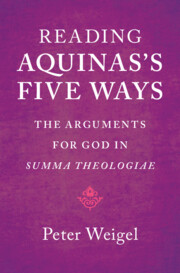Book contents
- Reading Aquinas’s Five Ways
- Reading Aquinas’s Five Ways
- Copyright page
- Dedication
- Epigraph
- Contents
- Acknowledgements
- Introduction
- Chapter 1 Approaching the Five Ways
- Chapter 2 On Causes and Giving an Account
- Chapter 3 Why Is There Something Rather than Nothing?
- Chapter 4 The First Way
- Chapter 5 The Second Way
- Chapter 6 The Third Way
- Chapter 7 The Fourth Way
- Chapter 8 The Fifth Way
- Chapter 9 Concluding Remarks
- Bibliography
- Index
Chapter 2 - On Causes and Giving an Account
Published online by Cambridge University Press: 05 June 2025
- Reading Aquinas’s Five Ways
- Reading Aquinas’s Five Ways
- Copyright page
- Dedication
- Epigraph
- Contents
- Acknowledgements
- Introduction
- Chapter 1 Approaching the Five Ways
- Chapter 2 On Causes and Giving an Account
- Chapter 3 Why Is There Something Rather than Nothing?
- Chapter 4 The First Way
- Chapter 5 The Second Way
- Chapter 6 The Third Way
- Chapter 7 The Fourth Way
- Chapter 8 The Fifth Way
- Chapter 9 Concluding Remarks
- Bibliography
- Index
Summary
Chapter 2 covers elements in Aquinas’s metaphysics and his views on causation as part of the philosophical background for understanding the Five Ways. Attention is given to Aristotle’s explanations of change and his four causes: material, formal, efficient, and final. The chapter then examines Aquinas’s metaphysics of existence and his distinction between essence and existence, which features a contrast between caused and uncaused existence prominent in the Five Ways. There is a brief look at some more recent views of existence influenced by Immanuel Kant and others, which call Aquinas’s views into question. Finally, the chapter explains Aquinas’s model of explanation, that is, his views on what needs accounting for and how it is to be done. (There is some contrast with Gottfried Wilhelm Leibniz’s views.) Aquinas seeks a complete account for why contingently existing individual objects exist at all and undergo changes. He thinks that what has caused existence must ultimately be accounted for by what has uncaused existence.
Keywords
Information
- Type
- Chapter
- Information
- Reading Aquinas's Five WaysThe Arguments for God in <i>Summa Theologiae</i>, pp. 30 - 54Publisher: Cambridge University PressPrint publication year: 2025
